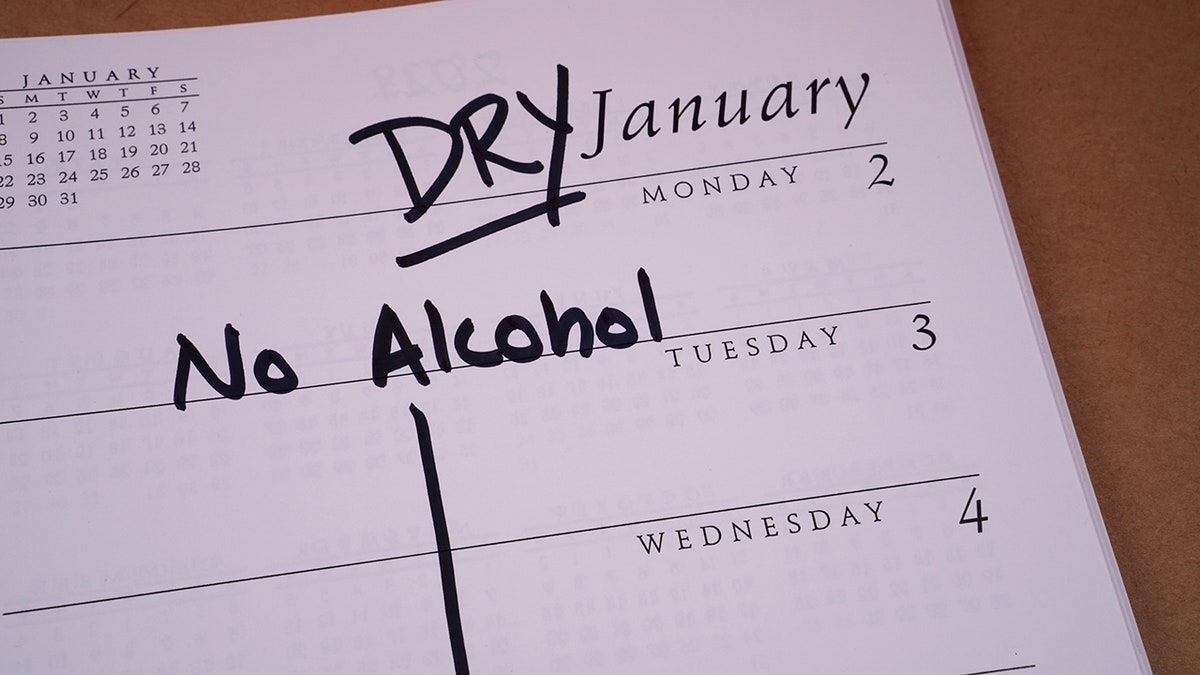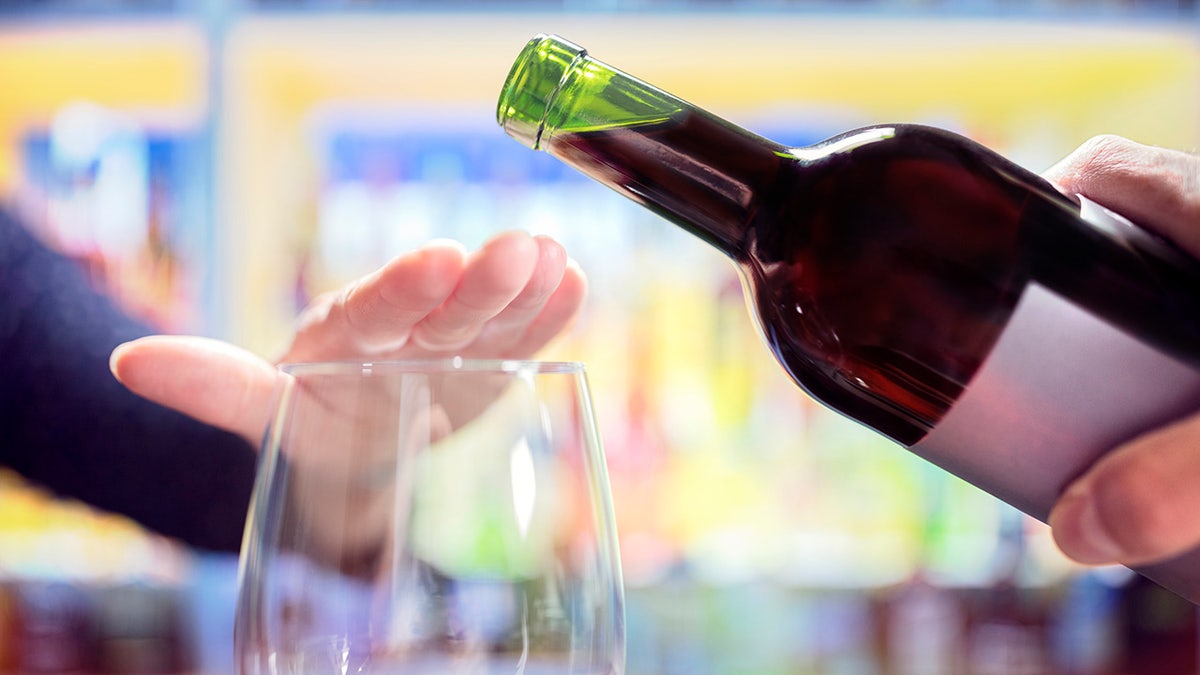Alcohol linked to 7 types of cancer
Dr. Nicole Saphier joins 'America's Newsroom' to discuss the surgeon general pushing for cancer warning labels on alcohol and the CDC warning of norovirus cases surging in parts of the U.S.
For those looking to embrace a healthier lifestyle, the start of the New Year sometimes means the start of "Dry January."
The trend coincides with the U.S. surgeon general's new advisory warning about alcohol-related cancer risk.
Dr. Vivek Murthy issued the guidance on Friday following research that has linked alcohol to at least seven types of cancer.
‘I’M A PSYCHOLOGIST – HERE'S HOW TO FINALLY BREAK YOUR BAD HABITS'
"Dry January" encourages people to abstain from alcohol as a way to improve their health and well-being — but does this month-long drinking hiatus truly impact health in a positive way?
For the most part, experts say yes, though it’s not an absolute must for everyone.

Dry January is a month-long public health campaign that encourages people to stay sober and alcohol-free. (iStock)
"Ultimately, sober months like Dry January can be harmless for the majority of the population who do not have a severe alcohol use disorder," said Dr. Deni Carise of Conshohocken, Pennsylvania, former chief science officer at the Recovery Centers of America.
Alcohol consumption has been linked to at least seven types of cancer, according to the U.S. surgeon general's advisory.
"Diagnoses are characterized as mild, moderate or severe," Carise continued. "Those who drink heavily could encounter very serious health risks when quitting abruptly and should take caution."
"I’ve been doing it for years," John Hayes, a financial broker in Atlanta, Georgia, told Fox News Digital in 2023 about Dry January. "It is a great chance to hit the reset button after so many holiday parties from Thanksgiving and Christmas through New Year’s Eve."
DRINKING ALCOHOL IS LINKED TO SIX TYPES OF CANCER, EXPERTS SAY: ‘IT’S TOXIC'
The benefits of Dry January can vary from person to person, but for many, it serves as a reset button after holiday indulgences, promoting overall well-being and healthy habits.
Research has shown that a month without alcohol leads to lower blood pressure, cholesterol and diabetes risk, as well as fewer cancer-related proteins in the blood.

Depending on a person's relationship with drinking, a month without alcohol can have a positive impact on physical and mental health, experts say. (iStock)
"It isn’t about giving anything up. It is about getting something back. Get your fun back. Get your energy back. Get your calm back," stated the group Alcohol Change UK, the organization behind the "Dry January" campaign.
If you’re thinking of participating in Dry January this year, there are some health factors to consider before ditching alcohol for an entire month.
Alcohol’s impact on physical health
Cutting out alcohol for a month can significantly reduce expenses, especially after the holiday season, which often involves increased spending. It's a chance to save money while also reassessing your spending habits.
‘ALCOHOL GENE’ COULD PREDICT HOW COCKTAILS MAY AFFECT YOU – AND THERE'S A TEST FOR IT
Aside from saving money from all the alcoholic beverages you won’t be purchasing for the month of January, the top health benefit you’ll receive is avoiding unnecessary calories, experts say.
A can of beer contains around 154 calories, while a 5-ounce serving of wine is around 123 calories, according to the USDA's FoodData Central database.

Aside from saving money from all the alcoholic beverages you won’t be purchasing, the top health benefit of Dry January is avoiding unnecessary calories. (iStock)
Spirits and liquors like sake, whiskey, vodka, rum and gin tend to be under 100 calories, but that’s on a per-ounce basis. The totals can ratchet up quickly when people drink cocktails.
Calorie intake estimates published by the FDA state that men and women over the age of 21 can potentially consume 2,400 to 3,000 calories and 2,000 to 2,400 calories per day, respectively, depending on how active their lifestyles are.
"Understanding one’s relationship with alcohol is imperative before deciding to cut it off completely and suddenly."
Avoiding alcohol could also potentially improve digestive health, according to experts.
Alcohol is considered a diuretic, so it increases the passing of urine, which could have a dehydrating effect if a person is not drinking enough water.
A study by The American Journal of Gastroenterology found that "heavy alcohol intake" appears to "exacerbate gastrointestinal symptoms in adults with irritable bowel syndrome," which includes symptoms like abdominal and stomach pain, bloating, intestinal gas, diarrhea, constipation, nausea, heartburn and indigestion.

Drinking alcohol before bed can have negative effects on sleep. (iStock)
Drinking alcohol before bed has also been found to interrupt rapid eye movement (REM) sleep and have insomnia-like effects, according to the National Sleep Foundation, a Washington, D.C.-based nonprofit that provides expert-backed information on sleep.
For more Health articles, visit www.foxnews.com/health
Abstaining from alcoholic beverages at night and in general could potentially provide deeper, more consistent sleep, which may lead to higher energy levels throughout the day, the nonprofit reports.
Improved sleep quality also yields increased daytime energy and a refreshed mindset.
Alcohol’s impact on mental health
Cutting out alcohol can also have positive effects on mental health, according to Dr. Daryl Appleton, a psychotherapist who practices in New York City and New England.
"A lot of my clients engage in Dry January as a mental and emotional detox and ritual in self-control," Appleton previously told Fox News Digital.
Each person's medical history and intentions around drinking for the rest of the year dictate the health impact Dry January will have, he noted.

Experts say abstaining from alcohol can help improve mental health. (iStock)
She continued, "On the positive side, allowing your body and brain to take a break from alcohol can potentially decrease cortisol and the stress it puts on the system, which allows for rest and repair. Since alcohol is a depressant, taking a break can also uncover whether alcohol is masking emotional symptoms as a [bandage], or is contributing to them by making anger, sadness and isolation feel worse."
Sober months like Dry January help people evaluate their relationship with alcohol, she added.
ALCOHOL DEATHS HAVE MORE THAN DOUBLED IN RECENT YEARS, ESPECIALLY AMONG WOMEN
Stepping away from alcohol often brings stable moods, reduced anxiety and an overall uplift in emotions, the expert noted. Many Dry January participants often report sharper mental clarity, improved focus and better concentration.
CLICK HERE TO SIGN UP FOR OUR HEALTH NEWSLETTER
"On the not-so-healthy side, if someone has an alcohol-use disorder, obviously stopping cold can lead to severe withdrawals, seizures and even death," Appleton warned.
"Understanding one’s relationship with alcohol is imperative before deciding to cut it off completely and suddenly."

Avoiding alcohol in social gatherings can be a challenge for some. (iStock)
Participating in Dry January comes with its share of hurdles. Avoiding alcohol in social gatherings where it's prevalent can make one feel left out or pressured to drink.
Overcoming ingrained habits tied to stress or emotions can be challenging, as alcohol might have been a coping mechanism.
"It isn’t about giving anything up. It is about getting something back."
Emotional fluctuations, such as irritability or cravings, may emerge during this period, especially in the absence of supportive surroundings. Successfully tackling these obstacles often involves planning, seeking supportive communities, and staying committed to personal reasons for embracing Dry January.
CLICK HERE TO GET THE FOX NEWS APP
Embracing these difficulties as part of the journey fosters resilience and a deeper understanding of one's relationship with alcohol, making Dry January a transformative experience beyond a simple month-long commitment.
Cortney Moore contributed reporting.








































